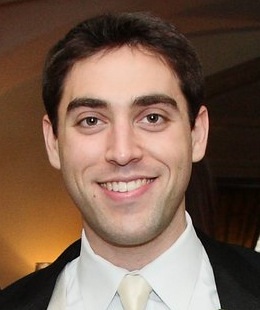EDF Climate Corps fellow | April 3, 2013
“Knocking down a brick wall by yourself with your bare fists is next to impossible. But organize a team equipped with sledgehammers and a plan, and it gets a whole lot easier,” said Gwen Ruta in a Fast Company Op-Ed explaining the concept behind EDF Climate Corps.
This blog post is the ninth in a series, highlighting our team of ‘sledgehammers’ – the 2012 EDF Climate Corps fellows– and their plans for breaking down the barriers to energy efficiency at their host organizations.
Name: Eric Yee
Host Organization: Port of Oakland
School: Purdue University Krannert School of Management
Opportunity: Climate Corps fellow Eric Yee was tasked with identifying ways to make the Port of Oakland more energy efficient.
Barrier: The Port of Oakland is massive, supporting over 73,000 jobs in the Bay Area. That size leads to a complex organizational setup divided into very specific and focused business units, including maritime, aviation, and commercial real estate. However, the need for environmental services such as recycling, storm water compliance, alternative fuels and energy efficiency tends to span all.
Solutions Identified: Yee conducted interviews with nearly two dozen Port staff from across departments, and it turned out, that those Yee interviewed began exchanging information with each other. The airport and real estate divisions traded knowledge about electric vehicle charging stations. The Port’s utility group discussed energy rebates with staff in Leasing. Many of the Port’s divisions began collaborating on energy and environmental issues because they recognized that each division may have its own specialized needs, but sharing best practice knowledge and ideas across the organization could lead to better, more complete solutions.
Quote: “Tackling sustainability and energy efficiency in an organization of any size can be difficult. However an interdivisional sustainability task force would be a great place to start.”
Name: Andrew Linowes 
Host Organization: Monmouth County
School: George Washington University Trachtenberg School of Public Policy and Public Administration
Opportunity: The County of Monmouth, New Jersey, was looking for innovative financial mechanisms to fund energy efficiency projects.
Barrier: In today’s economic climate, it is increasingly difficult for public entities to come up with the capital necessary to invest in energy efficiency improvements. Like most American local governments today, Monmouth was under pressure from residents to keep taxes low. The governing body recently reduced its budget for capital improvement, limiting its ability to invest in energy efficient technologies.
Solutions Identified: Linowes discovered that specialized contractors known as energy service companies (ESCOs) have put up capital for energy efficiency investments for several years, allowing building owners to pay them back over time. These agreements, referred to as energy savings performance contracts (ESPCs), enable local governments to get the benefits of installed efficiency measures without significant upfront capital expenditures or a voter referendum associated with debt service. Instead, the annual financial savings from energy conservation (a net positive cash flow) could be used to pay off their debt to the ESCO.
Potential Savings: Through utilizing innovative financing mechanisms, Linowes identified efficiency projects Monmouth could implement that would save more than $45,000 in maintenance costs every year.”
Quote: “Skeptics of this model argue that the contract does not allow the governing body to realize the full benefit of the energy efficiency, because much of the resulting savings are used service debt to the ESCO. My response is that without this arrangement, many local governments would be unable to take advantage of any savings.”
Name: Joseph Martin
Host Organization: Union Pacific Corporation
School: MIT Sloan School of Management
Opportunity: Union Pacific wanted to identify ways to improve energy efficiency across the organization.
Barrier: While it is possible to change the world, impact your surroundings and influence positive growth, it is a bit easier said than done. When Martin proposed his initial ideas to managers, they did not expeditiously rally to implement them as he had imagined.
Solutions Identified: After consulting with a supervisor, Martin realized that he needed to narrow the scope and specificity of his vision. He also built momentum by succeeding with his first project delamping soda machines. From this success he was able to move on to work on a maintenance program for compressed air systems and pursue a compressed natural gas vehicle pilot project.
Potential Savings: Joe Martin's recommendations could save Union Pacific up to $516,000, 32 million kilowatt hours of energy use and 22,000 metric tons of carbon dioxide emissions annually. If Martin's recommendations were to be expanded to other Union Pacific locations, the company could realize $713,000 in additional savings every year.
Quote: “At Union Pacific, I changed the world, albeit in a small way.”
About EDF Climate Corps
EDF Climate Corps (edfclimatecorps.org) taps the talents of tomorrow’s leaders to save energy, money and the environment by placing specially-trained EDF fellows in companies, cities and universities as dedicated energy problem solvers. Working with hundreds of leading organizations, EDF Climate Corps has found an average of $1 million in energy savings for each participant. For more information, visit edfclimatecorps.org. Read our blog at edfclimatecorps.org/blog. Follow us on Twitter at twitter.com/edfbiz and on Facebook at facebook.com/EDFClimateCorps.
About Environmental Defense Fund
Environmental Defense Fund (edf.org), a leading national nonprofit organization, creates transformational solutions to the most serious environmental problems. EDF links science, economics, law and innovative private-sector partnerships. For more information, visit edfbusiness.org. Read our blog at blogs.edf.org/business. Follow us on Twitter at twitter.com/EDFbiz.